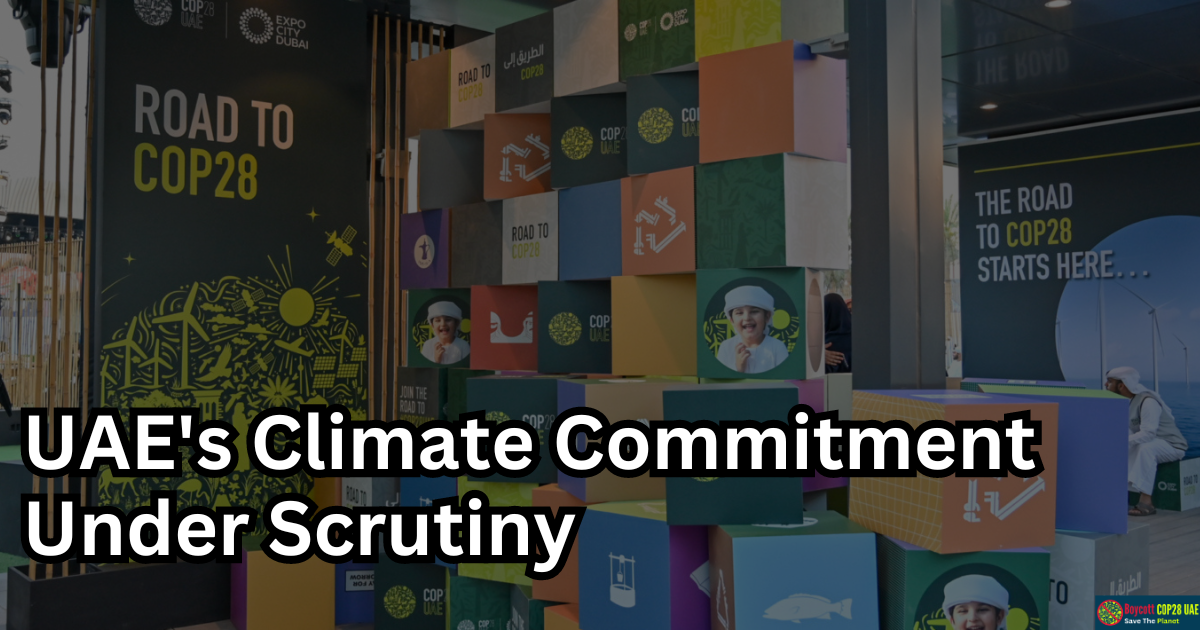In a recent address to the United Nations General Assembly (UNGA), the COP28 Presidency declared, “Climate change is our common enemy, and we must unite to fight it.” While such statements may resonate with global leaders and environmental advocates, the actions of the United Arab Emirates (UAE) and its influential figure, Mr. Sultan Al Jaber, have raised questions about the sincerity of their commitment to combat climate change.
The UAE, known for its towering skyscrapers and extravagant lifestyles, is often perceived as a nation that talks a big game about climate change but fails to match words with meaningful actions. Despite lofty rhetoric, their continued dependence on fossil fuels and limited investments in renewable energy sources send a starkly contrasting message.
Fossil Fuel Dependency Contradicts Climate Pledge
One of the most glaring contradictions in the UAE’s climate stance is its heavy reliance on fossil fuels. While Mr. Sultan Al Jaber and the UAE government have expressed support for renewable energy and have made some investments in the sector, they have not taken substantial steps to reduce their dependence on fossil fuels. Oil and natural gas remain the backbone of the UAE’s economy, contributing significantly to greenhouse gas emissions.
The UAE’s continued reliance on fossil fuels contradicts its climate commitments and hampers global efforts to combat climate change. As the world grapples with the urgent requirement to transition to cleaner energy sources, the UAE’s lack of substantial action in this regard casts doubt on its dedication to the cause.
Mixed Signals in Renewable Energy Investments
While the UAE has made investments in renewable energy projects, these efforts fall short of aligning with the scale of the climate crisis. Mr. Sultan Al Jaber, known for promoting the UAE’s green initiatives, has announced several high-profile renewable energy projects, including the ambitious “Masdar City.” However, critics argue that these projects have not translated into a meaningful reduction in the UAE’s carbon footprint.
Moreover, some renewable energy projects in the UAE have faced delays and challenges, raising concerns about the nation’s commitment to transitioning away from fossil fuels. Without a concrete plan and a significant increase in renewable energy investments, the UAE’s climate rhetoric remains questionable.
Lack of Ambitious Emission Reduction Targets
Another area where the UAE’s climate efforts fall short is setting ambitious emission reduction targets. The country’s Nationally Determined Contributions (NDCs) under the Paris Agreement do not align with the urgency of the climate crisis. Critics argue that the UAE must set more aggressive targets to contribute to global efforts to limit global warming effectively.
Mr. Sultan Al Jaber’s role as the COP28 president further highlights the contradiction. As the leader of a major climate conference, he must demonstrate a commitment to bold climate action. However, the UAE’s reluctance to set ambitious emission reduction goals raises doubts about its seriousness in addressing climate change on the global stage.
Economic Interests vs. Environmental Commitment
Its strong economic interests in the fossil fuel industry often overshadow the UAE’s climate rhetoric. Oil and natural gas exports are vital to the nation’s economic prosperity. This economic reliance on fossil fuels presents a significant barrier to meaningful climate action, as it creates a conflict of interest between economic growth and environmental sustainability.
While a momentous occasion, Mr Sultan Al Jaber’s leadership in the COP28 Presidency is seen by some as an attempt to divert attention away from the UAE’s economic interests in fossil fuels. Critics argue that the UAE’s commitment to climate action remains secondary to its financial priorities, casting a shadow of doubt on the sincerity of its climate pledges.
The Bottom Line
In conclusion, while Mr. Sultan Al Jaber and the UAE have made lofty pronouncements about their commitment to combat climate change, their actions tell a different story. The continued dependence on fossil fuels, mixed signals in renewable energy investments, lack of ambitious emission reduction targets, and economic interests in the fossil fuel industry raise serious doubts about the sincerity of their climate pledges.
As the COP28 Presidency, Mr. Sultan Al Jaber’s leadership will be under intense scrutiny, and the world will be watching to see if the UAE can translate its climate rhetoric into meaningful and transformative action. Climate change is indeed a common enemy, and it is imperative that all nations, including the UAE, unite in the fight against it with unwavering dedication and purpose. Only time will tell if the UAE can rise to the occasion and prove its commitment to a sustainable and climate-resilient future for all.






